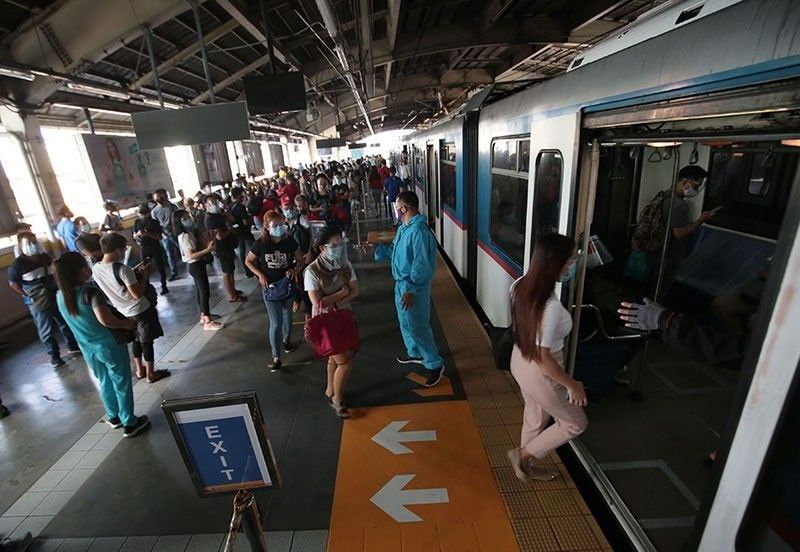Beep card operator denies accusations of profiteering as shortage slows commute

MANILA, Philippines — Beep card operator AF Payments Inc. defended itself from accusations of profiteering amid the shortage of Beep cards in stations of the Metro Rail Transit-Line 3 as stressed that it has been subsidizing the cost of cards for years.
The stored-value cards for public transportation have reportedly been out of stock in some train stations along the MRT-3 line. Cards, however, are being sold for a steeper P188 through AF Payments' official online stores in online shopping platforms Lazada and Shopee. If bought from a rail station, the card's price is P100 with a P70 load balance.
In a statement issued through the Department of Transportation's communications team, the company said that its allocation of cards for online sales was less than 1% while only .08% went to online card sales. Meanwhile, more than 95% of cards went to rail stations and are subsidized by AFPI and the national government.
"We do not profit from our cards. This is evidenced by the fact that we are subsidizing the cards," the company said. It said it has spent P60 million in card subsidies since operations began.
"Last year we spent P12.5 million and this year we doubled our subsidies to P24 million. Next year, we estimate our subsidies to reach P70 million," AF Payments Inc. said. "So we cannot be accused of profiting from an operation we are subsidizing."
Shortage forces commuters to line up for single-use cards
This comes after Sen. Grace Poe called on the transportation department to explain why some train stations were running out of beep cards, pointing out that this forced commuters to line up for single-journey tickets which only congested stations further.
"The time spent lining up for every single-journey ticket is a moment wasted for our already weary commuters," the senator said. "The lack of Beep cards is a step backward to our goal to digitalize our transportation payment scheme as a safer and more convenient mode."
Before the Senate Committee on Finance in September, Light Rail Transit Authority administrator Hernando Cabrera said that the shortage was caused by a volatile supply chain for the microchips needed for the cards amid the Ukraine-Russia conflict, the lingering effects of COVID-19 in major manufacturing hubs, and increased shipping costs.
"The issue is really the worldwide supply of microchips, so that's the problem. There is no problem with the plastic part, because we have a supply of that, and then worldwide there seem to be only two manufacturers, and then this is something proprietary so only one company holds the technology. But nevertheless, what they are doing at the moment is that they are trying to source out other suppliers here in Asia," he said then.
In a phone call with Philstar.com, Toix Cerna, spokesperson of commuter advocacy group Komyut called for more transparency in the government's public-private partnership with AFPI.
"They're able to provide in other platforms, but is there an accounting of how many are sold in Lazada and Shopee? You'd really have to think, is this a real shortage or an artificial shortage? It makes you question because AF Payments is the only supplier. I'm in the position where I would like to see what the contract is all about," she said.
"In the general scheme of things, it would be a big help if the DOTr could build a system that can be trusted, because when there's these kinds of news, people will have doubts. So instead of shifting to a modernized system and getting into the new way of doing things, maybe even more, will start to doubt the modernization."
Cards bought at $2 each
AFPI also defended the steep price difference in its online stores, saying it buys the cards at about $2 per piece but sells it to public transport operators at P50, while the latter further subsidizes the P20 and sells it at P30. According to the current exchange rate, one US dollar is around P56.
"Price difference in rail, non-rail and online is due to the fact that in rail, cards are heavily subsidized by AFPI and government. In non-rail (bus, ferry, retail) which is not covered by the CA, we sell at a higher price to recover card and distribution costs. For online, still a little higher to recover card, operating, VAT, and platform commissions. In all channels, we just aim to recover cost so being accused of profiteering is again inaccurate."
It also pointed out that "the most efficient way to reach a growing base of users is online" with the Beep card ecosystem growing beyond rail and even beyond Metro Manila.
"We have learned that Beep cards are being scalped online and most of the time at ridiculously high prices. Also, Beep cards being scalped online are not only used, damaged or poor quality, but many of them are near expiry. We feel the obligation to protect the online customers of Beep cards by ensuring them quality and authentic supply of cards," the company said.
"This is a service that is appreciated by people as not everyone can and would like to go to the rail stations to get a card and would prefer to buy it online...People still have a choice as to where to buy their cards as we ensure that all channels have allocations...the card shortage is no longer as much a concern as it was a few months back," the company said.
- Latest
- Trending






























